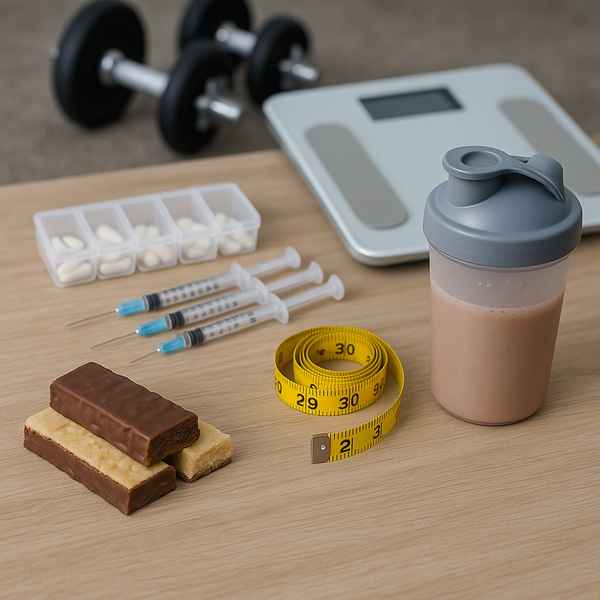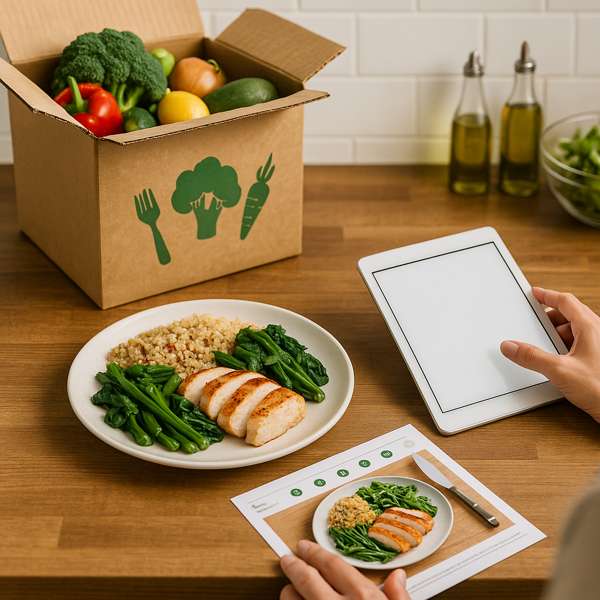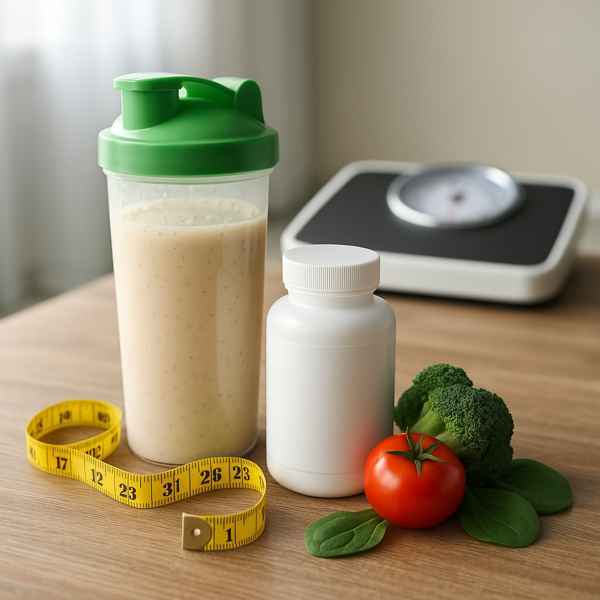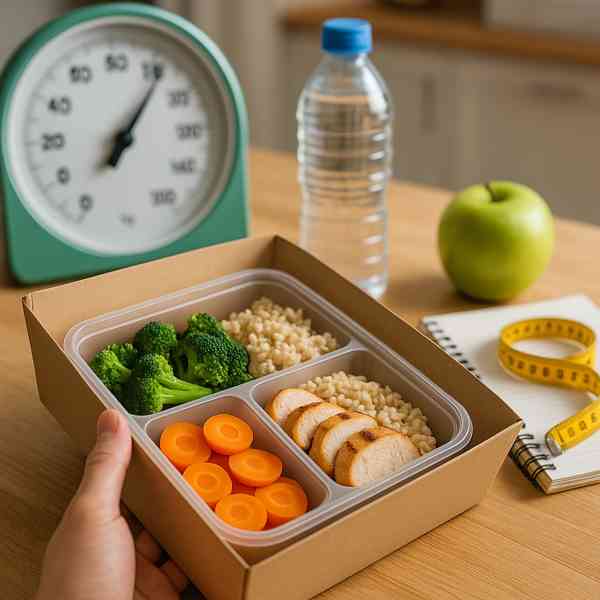Discover the Best Weight Loss Kits: Transform Your Health Journey Now!
Many people want to lose weight. It can be hard to know where to start. Weight loss kits might help. These kits offer different tools and support. They often include meal plans, shakes, or supplements. Some also have exercise guides. Companies like Herbalife and Amway sell these kits. People use them to manage their weight. But, not all kits work the same way. Some might have side effects. It’s important to learn more before using them. This article will explore weight loss kits in detail.
Understanding What Weight Loss Kits Are
![]()
Weight loss kits are packages designed to help people lose weight. They usually contain several items. These can include:
- Meal plans or recipes
- Supplements like vitamins or protein shakes
- Exercise guides or equipment
- Instructions on how to use the kit
The goal is to make losing weight easier. Each item in the kit plays a role. Meal plans provide healthy eating options. Supplements can boost energy or metabolism. Exercise guides show ways to stay active. Together, they form a complete system for weight management.
Some popular brands include Herbalife and Amway. These companies have been around for years. They offer different types of weight loss kits. Some focus on cleansing the body. Others aim to kickstart a new diet plan. Understanding what each kit offers is important.
Not all kits are the same. Some people prefer meal delivery services. These services send pre-made meals to your home. This can save time and help with portion control. Other kits require more preparation. Choosing the right kit depends on personal needs and lifestyle.
Overall, weight loss kits can be helpful. They provide structure and guidance. However, they are not magic solutions. Users must still put in effort. Diet and exercise are key parts of any successful weight loss journey.

Types of Weight Loss Kits Available
![]()
There are many types of weight loss kits. Each one serves a different purpose. Here are some common types:
- Meal Kits: These include recipes and ingredients. They help users cook healthy meals at home.
- Cleanse Kits: These focus on detoxifying the body. They often include juices or special drinks.
- Starter Kits: Designed for beginners. They provide basic tools for weight management.
- Supplement Kits: Contain vitamins, minerals, or herbal products. They support metabolism and energy levels.
- Exercise Kits: Include workout plans or equipment. Help users stay physically active.
Each type has its benefits and drawbacks. Meal kits are great for learning to cook healthily. Cleanse kits may remove toxins but could lack nutrients. Starter kits simplify the process for newcomers. Supplement kits enhance nutrition but require caution. Exercise kits motivate physical activity.
Choosing the best weight loss kit depends on individual goals. Some people want to learn better eating habits. Others wish to jumpstart their metabolism. A few prefer focusing on physical fitness. Selecting the right kit involves knowing one’s priorities.
For example, someone who dislikes cooking might choose a meal delivery service. A person interested in natural remedies may opt for a herbal cleanse. Those wanting a full-body approach might combine different kits. The variety ensures everyone can find something suitable.

How Weight Loss Meal Kits Work
![]()
Weight loss meal kits focus on food. They help users eat healthier meals. These kits usually come with:
- Pre-measured ingredients
- Easy-to-follow recipes
- Nutritional information
The idea is simple. By providing everything needed, meal kits make healthy cooking easy. Users do not need to shop for groceries. They receive all ingredients in the right amounts. This helps prevent overeating and reduces food waste.
Recipes guide users through each step. They teach how to prepare balanced meals. Nutritional information shows calorie counts and nutrient content. This helps people understand what they are eating.
Meal kits can be part of a weight management strategy. They encourage home cooking, which is often healthier than eating out. Cooking at home allows control over ingredients and portion sizes.
Some meal kits even offer customization. Users can choose meals based on dietary preferences. Options may include vegetarian, low-carb, or gluten-free choices. This flexibility makes meal kits appealing to many people.
Statistics show that people who cook at home tend to have better diets. A study found that those who cooked more frequently consumed fewer calories and less sugar. Meal kits can support this habit by simplifying the cooking process.

Exploring Weight Loss Cleanse Kits
![]()
Weight loss cleanse kits aim to detoxify the body. They claim to remove toxins and improve digestion. Common components include:
- Herbal teas or supplements
- Special juices or drinks
- Guidelines for fasting or limited eating
The concept is to give the digestive system a break. By consuming only liquids or light foods, the body can focus on detoxification. Proponents say this leads to improved energy and clearer skin.
However, cleanse kits are controversial. Critics argue that the body naturally detoxifies itself. There is little scientific evidence supporting the need for cleanses. Some kits may lack essential nutrients, leading to fatigue or weakness.
Despite this, cleanse kits remain popular. Many people report feeling rejuvenated after completing a cleanse. Success stories often mention weight loss and increased vitality.
It’s important to approach cleanse kits with caution. Not all products are safe or effective. Reading reviews and consulting healthcare professionals can help. Ensuring proper nutrition during a cleanse is crucial.
Ultimately, cleanse kits may offer short-term benefits but are not a long-term solution. Sustainable weight loss requires a balanced diet and regular exercise. Cleanses can be a starting point but should not replace healthy habits.

Finding Weight Loss Kits That Work
![]()
Finding effective weight loss kits can be challenging. With so many options available, it’s important to consider several factors:
- Research: Read reviews and testimonials. Look for success stories from real users.
- Ingredients: Check labels for quality and safety. Avoid kits with harmful additives.
- Goals: Choose a kit that aligns with personal objectives. Consider whether the focus is on diet, exercise, or both.
- Budget: Compare prices and value. Expensive does not always mean better.
- Support: Some kits offer coaching or community support. This can be beneficial for motivation.
One approach is to start with a weight loss starter kit. These provide basic tools to begin the journey. They often include simple meal plans and exercise tips.
Another option is to try well-known brands like Herbalife or Amway. These companies have established reputations. Their products have been used by many people worldwide.
It’s also wise to consult a healthcare professional. A doctor or nutritionist can offer personalized advice. They can recommend suitable products and monitor progress.
Remember that no kit guarantees results. Weight loss requires commitment and effort. Kits can aid the process but are not miracle cures.
In conclusion, finding the best weight loss kit involves research and self-reflection. Knowing one’s needs and preferences is key to making an informed choice.

Potential Side Effects of Weight Loss Kits
![]()
While weight loss kits can help, they may also have side effects. It’s important to be aware of potential risks:
- Allergic Reactions: Ingredients in supplements may cause allergies.
- Digestive Issues: Some kits can lead to bloating or diarrhea.
- Nutrient Deficiency: Restrictive diets might lack essential vitamins.
- Dependence: Relying solely on kits can hinder long-term success.
- Cost: Some kits are expensive and may not fit every budget.
For instance, the Herbalife weight loss kit side effects may include headaches or nausea. Users should read warnings and instructions carefully.
Amway weight loss kits are generally considered safe. However, individuals with specific health conditions should consult a doctor first.
Understanding one’s body is crucial. Listening to physical cues can prevent negative reactions. If a product causes discomfort, it’s best to stop using it.
Additionally, not all kits suit everyone. Personal health history and lifestyle play significant roles. Tailoring choices to individual needs minimizes risks.
Overall, being informed and cautious enhances safety. Weight loss should not compromise well-being. Making thoughtful decisions ensures a healthier journey.

The Role of Meal Delivery in Weight Management
![]()
Meal delivery services are becoming popular for weight management. They offer convenience and variety. Here’s how they work:
- Pre-prepared Meals: Meals are cooked and delivered to your door.
- Customizable Plans: Choose meals based on dietary needs and goals.
- Portion Control: Meals are portioned to avoid overeating.
This service saves time and effort. Busy individuals can enjoy healthy meals without cooking. It also helps those who struggle with meal planning.
Many companies offer weight loss meal kits as part of their service. These kits focus on low-calorie, nutrient-rich options. Users can select meals that align with their weight loss goals.
Studies show that meal delivery can support weight management. A survey found that participants who used these services lost more weight than those who did not.
However, meal delivery is not for everyone. Some people prefer cooking their meals. Others may find the cost prohibitive. Evaluating personal preferences and budget is essential.
In summary, meal delivery offers a practical solution for those seeking convenience. It supports healthy eating habits and aids in weight management. For many, it’s a valuable tool in their weight loss journey.

Conclusion: Key Takeaways About Weight Loss Kits
![]()
Weight loss kits provide various tools to assist in shedding pounds. They come in different forms, including meal kits, cleanse kits, and supplement kits. Each type offers unique benefits and challenges.
Meal kits promote healthy cooking and portion control. Cleanse kits focus on detoxification but require caution. Supplement kits enhance nutrition but need careful selection.
The effectiveness of weight loss kits varies. Researching products and understanding personal needs is crucial. Consulting healthcare professionals can provide additional guidance.
Potential side effects exist, such as allergic reactions or nutrient deficiencies. Being informed helps minimize risks.
Meal delivery services complement weight loss efforts by offering convenience and variety. They cater to busy lifestyles and support healthy eating habits.
Ultimately, weight loss requires commitment and effort. Kits and services can aid the process but are not standalone solutions. Combining them with a balanced diet and regular exercise ensures long-term success.